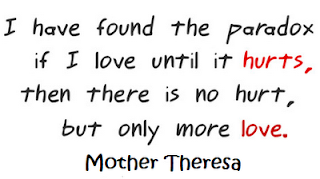Now the thing I love most about the church is that it seems so backward most of the time. We go against most of what the world values, as we heard last week; we find power in places such as suffering, death, and babes in mangers; and the church year begins with the end.
 Where you might think the church year would start somewhere logical, like with creation, or Jesus' birth foretold, instead we start right where the whole thing ends, with Christ's return. Our gospel text this week comes from Luke 21, a picture of signs of the end times and Jesus' second coming. Biblical scholar and self-proclaimed Jesus freak Mark Allen Powell has this to say:
Where you might think the church year would start somewhere logical, like with creation, or Jesus' birth foretold, instead we start right where the whole thing ends, with Christ's return. Our gospel text this week comes from Luke 21, a picture of signs of the end times and Jesus' second coming. Biblical scholar and self-proclaimed Jesus freak Mark Allen Powell has this to say:If psychology tells us that what we are is determined by our past, then eschatology tells us that what we can be is determined by our future. In other words, what we know and believe about our future has a genuine effect on the present. Ultimately, 'hope' is what makes all the difference.
mission, meaning, purpose - all are grounded in hope
In other words, knowing what is coming, knowing what is at the end of it all, impacts how we live our present. Yes, we are shaped by our past experiences. Everyone is, and psychology can help shed a lot of light on that aspect of humanity. However as people of faith we also believe in the future.
Without knowing the ending we might, perhaps, do as the gospel of Luke tells us not to, that is,
have "hearts weighed down with dissipation and drunkenness and the worries of this life." (Luke 21.34) Rather, Jesus says, because we know that at the end is salvation, eternal life, and peace, we ought to "stand up and raise our heads, because our redemption is drawing near." (Luke 21.28)
The interesting thing about this text is that the author of Luke promises that all of these signs will take place in our lifetimes, "For it will come upon all who live on the face of the whole earth." (Luke 21.35) Obviously it would seem, Christ did not come back in the lifetimes of the original readers and hearers of this text. Obviously, it would seem, Christ did not come back in the generations since. And, it would also seem, that at least so far, Christ has not returned in ours. So why, then, does it say all who live will have to face the end?
Well, perhaps this is another of those texts written with multiple meanings. Perhaps, as it would seem on the surface, we are being told of the final, ultimate coming of Christ. And, perhaps as is slightly less obvious, we are being told of the little, disruptions of life that mean the end of one thing and the beginning of another.
And the latter are endings we all experience. Disruptions include things like the ending of relationships - through death, divorce, moving, or simply from the natural run of things. Disruptions include things like the ending of chapters - through life transitions, job changes, or the way life simply changes who you are and how you are in the world. Disruptions include things like the start of a war, the drop of the economy and markets, Hurricane Sandy, and a severe drought.
Disruptions happen every day. And we have two ways of dealing with them. We can react with fear and foreboding or we can react with hope and certainty that with the disruption our redemption is drawing near.
We begin with the end. The Alpha and the Omega. The eternal One who brings salvation and who draws near in unexpected places and ways in the midst of little disruptions and, finally, at the end of times. After thinking on the big end and the little disruptions, I am left to ponder my own life - where are my little disruptions and how do I react? Is this the beginning or the end?

